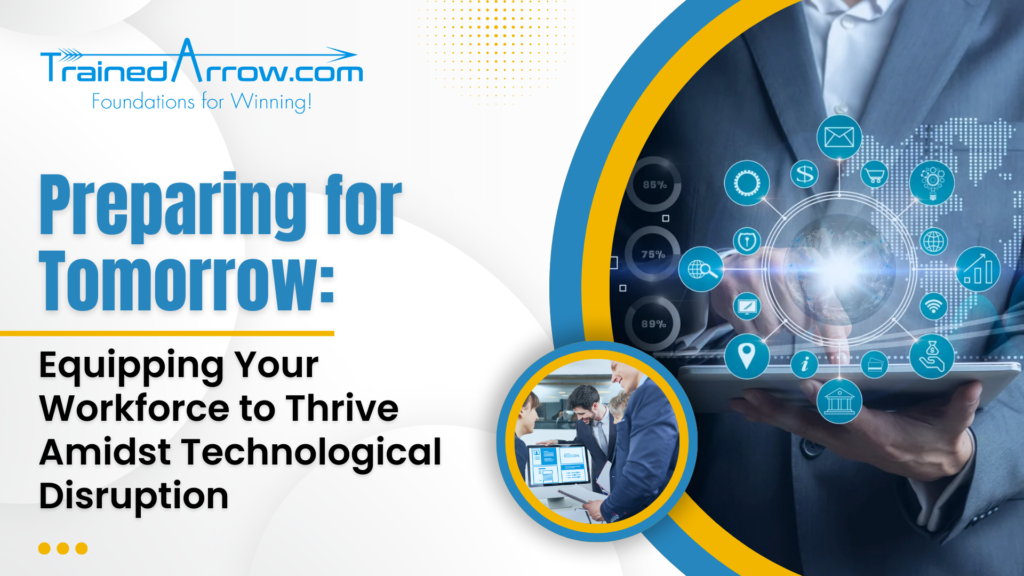As technology advances at an unprecedented pace, organizations are faced with the urgent need to prepare their workforce for the future. The integration of artificial intelligence (AI), automation, and digital transformation is not just reshaping industries—it’s redefining the nature of work and how value is delivered itself. To remain competitive in this evolving landscape, businesses must cultivate a workforce that can evolve, ready with learning agility, and capable of navigating the complexities of a digitally-driven world.
Understanding Technological Disruption
Technological disruption refers to the profound changes that occur when innovative technologies displace traditional practices. In recent years, advancements in AI and automation have been at the forefront of this disruption, transforming how businesses operate and creating a pressing demand for people who can hit the ground running.
Strategic Approaches to Workforce Preparedness
1. Investing in Continuous Learning and Development
To stay competitive, organizations must prioritize continuous learning as a cornerstone of their workforce strategy. This involves offering tailored training programs that focus on emerging technologies, such as AI and data analytics, while also fostering critical soft skills like adaptability and complex problem-solving. By investing in continuous learning, businesses equip employees with the skills they need today and prepare them for the unknown challenges of tomorrow.
2. Embracing Digital Transformation
Digital transformation is no longer an option; it is a business imperative. By integrating advanced digital tools and platforms into daily operations, organizations can streamline processes, enhance customer experiences, and foster a culture of innovation. Leaders play a crucial role in championing this transformation, ensuring that their teams are not only comfortable with new technologies but also skilled in leveraging them to drive business outcomes.
3. Fostering a Culture of Learning Agility
Agility forms the foundational capability for innovation, which in turn is the lifeblood of progress, and it is essential for organizations to create an environment where it can thrive. This means encouraging employees to experiment with new ideas and technologies, supporting creative problem-solving, and removing barriers to collective endeavors. Companies that successfully cultivate a culture of innovation will be better positioned to adapt to technological disruptions and capitalize on new opportunities.
4. Reworking Operating models
The traditional modes are rapidly evolving. With the rise of remote work, hybrid arrangements, and project-based teams, organizations must rethink how work is structured. These new models offer greater flexibility, allowing businesses to tap into a global talent pool and provide employees with the work-life balance they increasingly seek. Adapting to these changes will be crucial for attracting and retaining top talent in a competitive job market.
5. Enhancing Leadership for the Digital Age
As technology reshapes the workplace, leadership must evolve accordingly. Today’s leaders need to be digitally literate, capable of guiding their teams through technological changes, and skilled in managing a diverse and often dispersed workforce. Leadership development programs should focus on building these competencies, ensuring that leaders are equipped to navigate the complexities of the digital era.
The Competitive Edge of a Prepared Workforce
Organizations that successfully prepare their workforce for disruptions will gain a significant competitive advantage. By fostering a culture of acquiring ‘strengths’ along with contemporary skills, embracing digital way of doing business, and promoting innovation, businesses can enhance their agility, boost employee engagement, and drive sustained growth. Moreover, a well-prepared workforce is better positioned to seize new opportunities, adapt to market shifts, and lead the way in a rapidly changing landscape.
Conclusion
The future of work is being defined by disruptions, and the organizations that will thrive are those that prepare their workforce today. By strategically investing in strengthening and fostering a culture of innovation, businesses can ensure that their teams are not only ready for the future but are actively driving it. The key to long-term success lies in a proactive, forward-thinking approach that empowers employees to excel in an always-on transformation environments.
![]()








